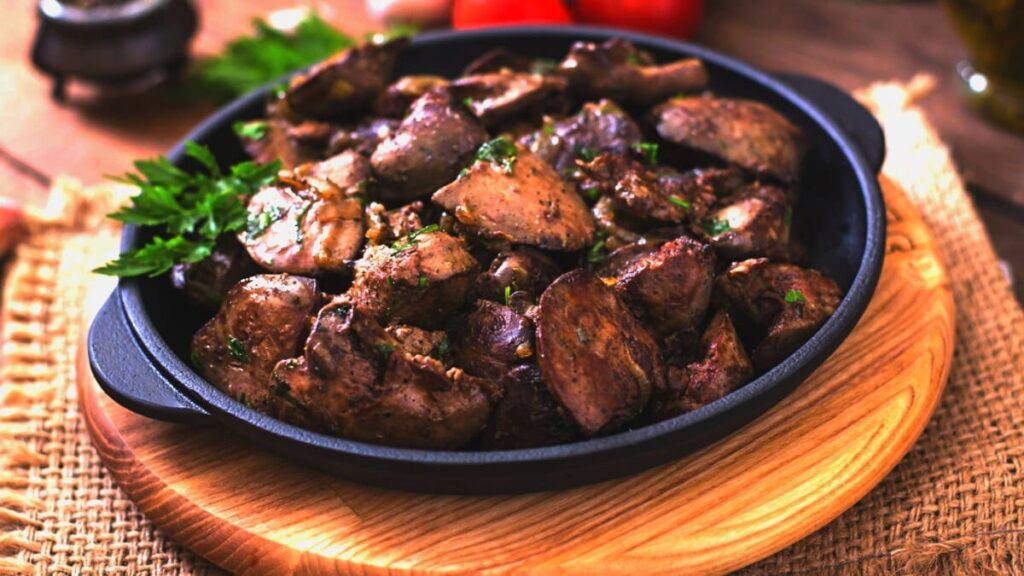
Chicken liver is often overlooked in favor of other protein sources, but this organ meat packs a nutritional punch. Rich in essential vitamins and minerals, chicken liver is a superfood that supports various bodily functions, from boosting immunity to improving energy levels. This article delves into the nutrition profile, benefits, and potential considerations of including chicken liver in your diet.
What Makes Chicken Liver Unique?
Chicken liver belongs to the category of organ meats, also known as offal. While some might shy away from it due to its strong flavor, its nutrient density makes it a valuable addition to a balanced diet. It’s particularly beneficial for individuals with iron deficiencies or those seeking a cost-effective protein source.
Nutritional Profile of Chicken Liver
A 100-gram serving of cooked chicken liver contains:
- Calories: 167
- Protein: 25 grams
- Fat: 4.8 grams
- Iron: 9 milligrams (50% of the Daily Value)
- Vitamin A: 6,600 IU (over 100% of the Daily Value)
- Vitamin B12: 16 micrograms (over 200% of the Daily Value)
- Folate: 588 micrograms (147% of the Daily Value)
- Riboflavin (Vitamin B2): 2.3 milligrams (135% of the Daily Value)
- Selenium: 36 micrograms (51% of the Daily Value)
Chicken liver is also low in carbohydrates and contains small amounts of potassium, phosphorus, and zinc.
Health Benefits of Chicken Liver
- Boosts Iron Levels: Chicken liver is an excellent source of heme iron, which is more easily absorbed by the body compared to non-heme iron found in plant sources. It helps combat anemia and supports oxygen transport in the blood.
- Supports Eye Health: The high vitamin A content in chicken liver is crucial for maintaining healthy vision, particularly in low-light conditions.
- Enhances Brain Function: Rich in vitamin B12 and folate, chicken liver promotes healthy brain function, supports nervous system health, and reduces the risk of cognitive decline.
- Strengthens Immunity: Vitamin A and selenium in chicken liver play a vital role in boosting the immune system, protecting against infections, and supporting overall health.
- Promotes Healthy Skin: The combination of riboflavin and vitamin A helps maintain healthy skin by reducing inflammation and supporting cellular repair.
- Supports Pregnancy: Folate is essential for fetal development during pregnancy, and chicken liver provides a substantial amount of this critical nutrient.
Incorporating Chicken Liver into Your Diet
Chicken liver is versatile and can be prepared in various ways to suit different taste preferences. Here are some popular methods:
- Sautéed Chicken Liver: Cooked with onions, garlic, and herbs, it makes a flavorful dish.
- Chicken Liver Pâté: A smooth spread made with butter and seasonings, perfect for appetizers.
- Grilled Chicken Liver: Skewered and grilled, it’s a popular street food in many cultures.
- Added to Soups and Stews: Enhances flavor and boosts nutritional content.
Who Should Eat Chicken Liver?
Chicken liver is particularly beneficial for:
- Individuals with iron-deficiency anemia
- Pregnant women (in moderation)
- Athletes needing high-quality protein
- Those seeking a nutrient-dense, low-cost food option
Potential Downsides of Chicken Liver
While chicken liver is highly nutritious, there are some considerations to keep in mind:
- Vitamin A Toxicity: Excessive consumption of chicken liver can lead to hypervitaminosis A, a condition caused by too much vitamin A. Moderation is key.
- Cholesterol Content: Chicken liver is high in cholesterol, which might concern individuals managing heart health or those with cholesterol-related conditions. However, research suggests dietary cholesterol has less impact on blood cholesterol levels than once believed.
- Taste Sensitivity: The strong flavor of chicken liver can be off-putting for some, but marinating or seasoning can help improve its taste.
- Storage and Safety: Chicken liver must be handled with care to avoid contamination. Always cook it thoroughly to reduce the risk of foodborne illness.
Comparison: Chicken Liver vs. Other Protein Sources
- Chicken Breast: While chicken breast is leaner, chicken liver offers more vitamins and minerals per serving.
- Beef Liver: Beef liver contains similar nutrients but is higher in calories and may have a stronger taste.
- Plant-Based Proteins: Chickpeas, lentils, and tofu are great alternatives for vegetarians but lack the heme iron and vitamin B12 found in chicken liver.
How to Choose and Store Chicken Liver
- Selection:
- Opt for fresh, firm chicken liver with a deep reddish-brown color.
- Avoid livers with a slimy texture or strong odor.
- Storage:
- Refrigerate immediately and use within 1-2 days.
- Freeze for longer storage, ensuring it’s packed in an airtight container.
- Cooking Tips:
- Always cook chicken liver to an internal temperature of 165°F (74°C).
- Avoid overcooking to retain tenderness and flavor.
Cultural and Culinary Significance
Chicken liver is a beloved ingredient in various cuisines around the world:
- Middle Eastern: Often used in dishes like liver kebabs or sautéed with spices.
- European: Featured in rich pâtés and terrines.
- Asian: Commonly stir-fried with vegetables or served in soups.
- African: Grilled or fried, often seasoned with bold spices.
By incorporating chicken liver into your meals, you can enjoy its rich flavor while reaping its impressive health benefits. With its high nutrient density and affordability, chicken liver deserves a place in your diet as a powerhouse of essential vitamins and minerals.
